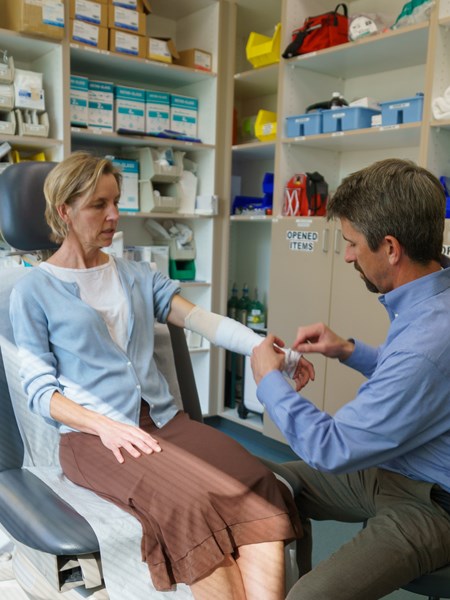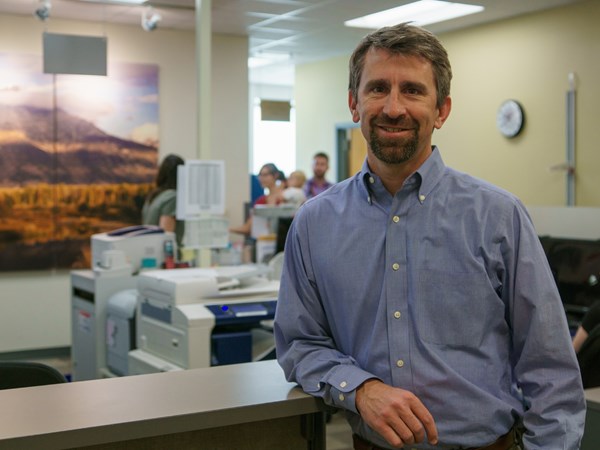SALT LAKE CITY, April 28, 2015 (GLOBE NEWSWIRE) -- Remember when the doctor came to your house? Well, your grandmother does. Now doctors are coming to the workplace. Not only is it convenient for employees—saving time and keeping them nearby—but, executives are seeing company savings in a time of rising healthcare costs.
Companies like Salt Lake City-based ARUP Laboratories, which provides its own healthcare insurance coverage to some 6,500 employees and their families, has found a way to save money despite climbing healthcare costs.
Over the last five years, ARUP has been honing an on-site "medical home" –a fully staffed primary care medical clinic and wellness program- for employees, spouses, domestic partners and their dependents.
Within its first four years using this approach, the company saw healthcare costs remain flat in a national setting where on average companies saw 7 percent increase in healthcare costs per year. Pleasantly surprised executives gave Medical Director Peter Weir the go-ahead to expand the clinic's staff and services.
Today the health clinic is staffed with 7 medical providers (two physicians and 5 mid-level providers), along with a mental health therapist, clinical pharmacist, nutritionist, and nurse case manager. They have over 25,000 patient visits per year.
Weir, a big believer in a full spectrum primary care has linked the medical care of patients with the on-site wellness program that includes one-on-one health coaching and fitness centers. In collaboration with the medical providers, the three certified wellness coaches individualize their approach and set unique goals for each patient.
"We figure out what is best for the employee and adapt to what they need and their schedules. We're able to develop a relationship with them and create accountability. That drives improvement in health," says Wellness Coach Seth Bigelow. He notes that those who use all three areas of the health benefits offered—physical, mental, and medical— get the best results.
Immediately Identifying the High-Risk Populations
Using a Personal Heath Profile (PHP) that all employees are incentivized to take annually, Weir and his staff have been able to identify high-risk patients and track their health trends. The first time they did this in 2011, 250 people were identified as having diabetes (Type I and Type II), over 20 people didn't even know they had the disease.
Diabetes is one of the six chronic diseases that the Centers for Disease Control and Prevention (CDC) claims are the "most common, costly, and preventable of all health problems." These chronic diseases account for two-thirds of healthcare cost in the country.
As of 2012, about half of all adults—117 million people—had one or more chronic health conditions. One of four adults has two or more chronic health conditions, according to the CDC.
Well aware of the steep costs, Weir and his staff approached the patients identified as having diabetes with the promise: "If you choose to get your care at the ARUP's on-site clinic, you will get your medications (including insulin) and diabetic supplies for free and we promise to do a better job managing your diabetes than anywhere else."
After hiring clinical pharmacist, a RN care manager, and a certified diabetic educator, he was sure he could keep his promise. Today almost all of the 250 people with diabetes use the clinic to manage their diabetes—results Weir has yet to find at any other organization.
"Our PHP is about triaging the entire company to define people's risks of chronic diseases with a particular focus on cardiovascular health," explains Weir, which uses this PHP data to create chronic disease registries (e.g. diabetes, heart disease, asthma).
"We use a healthcare team to proactively find these high risk individuals and draw them into the clinic and then plug them into our wellness program," adds Weir. These individuals now are receiving routine primary care visits with ARUP's medical providers, clinical pharmacist and one-one health coaching with our wellness staff.
He notes that many of these patients want help with improving their health because they fear not being around for their children or grandchildren.
Near future plans include collaborating more closely with the University of Utah medical center, and providing support/education groups for patient with common diagnosis (re: info on nutrition, physical activity, insulin management).
Quantifying the Savings
While there is an abundance of anecdotal feedback on lives changed (and saved) by this program, Weir cites a 2014 study done on PepsiCo's wellness program that concludes disease-management programs have a good return on investment, with $3.78 saved for every dollar invested in the case of PepsiCo. In this study, what drove the biggest reduction in healthcare costs was a 29 percent reduction in hospital admissions. Consider that even one hospital visit can stretch into tens of thousands of dollars.
"The PHP has allowed us to create a chronic disease care model that reduces the costs for everyone, including the patient," says Weir. ARUP has attracted companies from within Utah and from around the country interested in visiting and in studying the company's healthcare model.
"Work-site clinics" are a growing movement nationally; ARUP was ahead of the game, starting their clinic over 20 years ago. Today many companies both in Utah and other states have visited the clinic to see it firsthand.
"As far as we know, ARUP operates the largest onsite clinic in the state. There is nothing secret or special about what we are doing. What makes the model successful is that it is a win-win for the company and its population," says Weir. "Our focus is squarely on improving the health of the ARUP population. That helps patients. And as it turns out, that reduces the company's healthcare costs."
About ARUP Laboratories
Founded in 1984, ARUP Laboratories is a leading national reference laboratory and a nonprofit enterprise of the University of Utah and its Department of Pathology. ARUP offers more than 3,000 tests and test combinations, ranging from routine screening tests to esoteric molecular and genetic assays. ARUP serves clients across the United States, including many of the nation's top university teaching hospitals and children's hospitals, as well as multihospital groups, major commercial laboratories, group purchasing organizations, military and other government facilities, and major clinics. In addition, ARUP is a worldwide leader in innovative laboratory research and development, led by the efforts of the ARUP Institute for Clinical and Experimental Pathology®.
Photos accompanying this release are available at:
http://www.globenewswire.com/newsroom/prs/?pkgid=32481
http://www.globenewswire.com/newsroom/prs/?pkgid=32482

